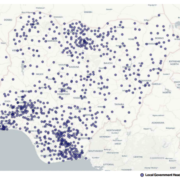By Dr Terence Milne PrEng, Managing Director of the Transport and Infrastructure Division at WSP in Africa
It has become universally clear that digital transformation is leaving no industry untouched. This is certainly the case for the engineering and construction industries. Digitalisation has changed how projects are conceived and delivered.
As a leader in this field, WSP Transport and Infrastructure has taken a digitally-led approach to our major project delivery, including the process-driven Engineering, Procurement, Construction Management (EPCM) delivery model. This lets us integrate technology, capture data, and turn it into actionable insights for contractors, owners, and end users.
RELATED MDAs Must Get NITDA’s Clearance For Nigeria’s N42b IT Projects
Through integrating project controls and paperless construction management into the design platform, we have developed a dynamic, flexible, and transparent process to help ensure that the overall project is delivered as designed. This also makes sure the scope is monitored and executed according to all the project’s requirements.
Digital engineering and delivery through maximising the use of BIM enables the creation of a fully virtual construction experience. Practically, creating a digital twin linked to schedule and estimate, the project’s progress and costing can be simulated.
For this to work, the project needs to be set up in a digital environment from inception. Adopting a multi-disciplinary approach requires the integration of engineering disciplines, project controls teams, and the end users. It is for that reason that we have been pushing the boundaries of BIM to create service offerings that include digital design, engineering analysis, 4D and 5D simulation, and asset management.
The foundation of this is the federated model: consolidating all design models from all disciplines, linking this to schedule and costs. Adopting this approach is only possible through strong partnerships with our clients, quantity surveyors, project management professionals, and contractors. The traditional skills that currently exist must be enhanced as engineering and construction projects become more ambitious.
In short, the digital approach to project delivery will greatly augment how efficiently construction can be done and produce better outcomes for all involved. This is done through access to real-time status and data, virtual modelling and simulation of the execution phase, issue control, paperless construction monitoring linked to the design model, and control dashboards inside the design platform.





























